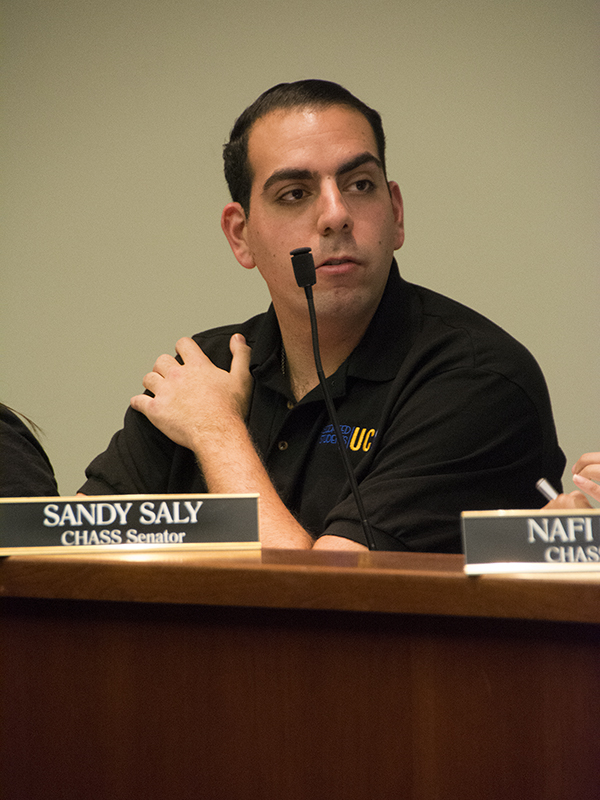
ASUCR senators unanimously passed a resolution to promote awareness and education of mental health services by collaborating with UCR’s Student Wellness Partners and Active Minds.
Authored by Vice President of External Affairs Kareem Aref and UCR students Morgan Nixon and Monika Vermani, the resolution is being prompted by incidents such as at UC Berkeley, where a third-year undergraduate, Maliq Nixon, committed suicide in 2013 because he was unable to obtain psychiatric help for his mental health disorder.
Other items cited in the resolution encourage the addition of another psychologist or psychiatrist on campus. Currently, UCR students are offered eight free short-term visits per year to the counseling center, but the authors of the resolution seek to increase that number to eight per quarter instead.
According to a national study, 27 percent of young adults between the ages of 18-24 experience mental health conditions. “With psychological treatment most mental illnesses can be controlled like depression, which is very treatable: more than 80 (percent) of cases get better with treatment,” the bill reads.
The resolution also supports the Syllabus Initiative Committee — falling under UCR’s Active Minds — which seeks to place mental health service information on campuswide academic syllabi before the end of Spring 2014. Dr. Christine Catipon, a campus psychologist at the Counseling Center, supports the bill, but feels that only the center’s website and phone are necessary to provide updated information on available services.
“It’s not as if (our service) isn’t out there, so I’m not sure how much information is needed,” she said. “I think that information would be sufficient because we don’t want to make people go … that’s not the point. But at least if (students) know our services are available, they can feel free to go.”
Catipon says students can also obtain referrals during walk-in services, if they are interested in obtaining therapy in the community — not limited to the eight designated visits on campus — through the campus health insurance. She adds that off-campus services are more frequent and unlimited to insured students, as opposed to the counseling center, which serves a campus population of more than 21,000 among a staff of 15 employees, including licensed psychologists and psychiatrists.
“For those who are in crisis or just really overwhelmed, people can just walk-in (they may have to wait a little bit) and be seen that day,” Catipon explained. “If there are any faculty members who are concerned about students, they can certainly encourage those students to do walk-in services.”
But the authors of the resolution also held the concern that university faculty members are often unaware of available campus health resources and are therefore unable to properly direct students.
In an effort to continue discussions in the future, ASUCR Vice President of Internal Affairs Johnny Ta plans to work with the Student Wellness Partners and other campus organizations to create an in-depth orientation about what mental health is. The partners consist of the Well, the Student Recreation Center, Housing and Dining Services, the Counseling Center, the Dean of Students and Student Health Services.
Ingrid Arteaga, a third-year global studies major and the Well’s Fit Squad Team Leader, said students may be better prompted to seek the help that they need, especially if they are better able to access this information on their syllabi.
The Well holds programs such as “Stomp out Stigma,” which Arteaga says is supposed to raise awareness about mental health. “Just because you go to a therapist … it doesn’t necessarily mean you’re weird or an outcast and I feel like a lot of people feel that way about mental health, so that’s why it’s a taboo or stigma to talk about it,” she said. “Just because you suffer from mental health or you know someone who does, there are resources for them to get help and … you don’t need to be ostracized for mental health issues because it can be dealt with.”
Senate Highlights
The ASUCR External Affairs Office is planning a 100-student march on Tuesday, Feb. 25 at Riverside City Hall, where undergraduates plan to deliver a resolution to find a “fair” way of addressing housing concerns. Rides will be provided to and from the event.
Spearheaded by CHASS senators Sean Famian, Nafi Karim, Abraham Galvan and Shadi Matar, the Greek Housing Row project seeks to allocate designated housing for the Greek organizations on campus. A major player in its creation is former Highlander News Opinions Editor Colette King, who hopes to reach out to the Greek national associations to provide the overall funding; a petition was launched last week to draw additional support from the UCR student body.
Located at the Highlander Union Building Plaza, the ASUCR presidential debates are scheduled for Wednesday, Feb. 26 at 1 p.m. The Highlander and KUCR will provide live coverage of the event.








